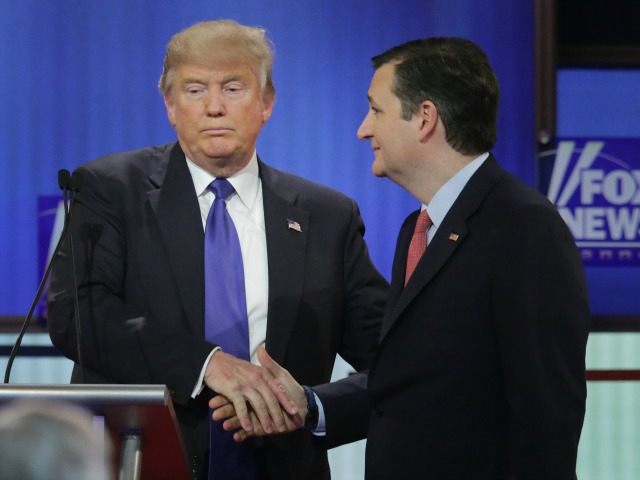The Republican nominating campaign restarts Tuesday with two potentially winner-take-all contests in Arizona and Utah.
Donald Trump will likely edge Ted Cruz in the bigger contest, Arizona, while Cruz looks to sweep Utah’s 40 delegates, although polling in both states is scant.
Arizona is a winner-take-all contest, awarding all of its 58 delegates to the winner of the statewide vote. It is a closed primary, meaning that only registered Republicans can participate in the primary. Arizona is also a state where early voting is especially prevalent. It is likely that around half the ballots will be cast long before election day. This feature of Arizona voting should give Trump an edge, as he has posted strong margins in early voting in most other states this year.
A recent poll from the local Fox News station shows Trump leading Cruz by six points among those that have already cast their ballots. Its head-to-head matchup shows Trump leading Cruz by 13 overall in the state, 46-33. John Kasich is a distant third with 17 percent support.
The poll shows Trump leading across the idealogical spectrum, beating Cruz among “very conservative,” “conservative,” and “moderate” voters. Cruz has campaigned at a number of events throughout the state, while Trump held a large rally outside Phoenix over the weekend.
Trump’s reported six-point lead among early voters suggests a much closer race than the 13-point margin would indicate. Trump generally does poorly among voters who decide late or wait to vote until election day.
While Trump is favored to capture all of Arizona’s delegates, his margin of victory is important. Even with the race narrowed to three candidates, Trump is still struggling to capture a majority of the Republican vote in any state.
Cruz’s ability to capitize on this is complicated by Kasich’s continued presence in the race. Cruz has long argued that he could defeat Trump in a one-on-one contest, but he is unlikely to get that scenario. Kasich isn’t campaigning in Arizona, devoting his time and limited resources to Utah. As such, Arizona is close to a one-on-one match-up. Although Cruz doesn’t win any delegates for a close second place finish, it would show he can be competitive in the three-way race that will complete the nominating process.
Cruz is in firm command of the vote in Utah. Two recent polls show him leading in the Beehive State by 20 points or more. The key for Cruz is to finish above the 50 percent threshold, which would award him all of the state’s 40 delegates. If he wins with less than a majority, the delegates are apportioned among the candidates finishing with at least 15 percent of the vote.
The main threat to Cruz in Utah is John Kasich. In one recent poll, Kasich has 29 percent support. Kasich has campaigned in Utah and even booked paid advertising in the state. Kasich’s goal in the state is to keep Cruz below the 50 percent threshold and win himself at least some delegates.
Cruz has campaigned with Utah Sen. Mike Lee in the past few days. On Friday, Mitt Romney announced that he would be supporting Cruz in the caucuses on Tuesday. Cruz has an extensive organization that has done well in caucuses this year, which should give him a good shot of capturing all of Utah’s delegates.
While both Arizona and Utah will allot their delegates on Tuesday, the states won’t select the actual individuals who will serve as delegates until state conventions at the end of April. These state conventions may become critically important if no candidate is likely to amass the 1,237 delegates necessary for the nomination.
The U.S. territory American Samoa also votes to select six delegates on Tuesday. These delegates aren’t bound to any candidate, until the caucus votes Tuesday to assign them to a candidate.
The likliest scenario on Tuesday is that Trump wins Arizona’s 58 delegates, while Cruz captures Utah’s 40 delegates. That would generally leave the nomination contest where it was before Little Tuesday.

COMMENTS
Please let us know if you're having issues with commenting.